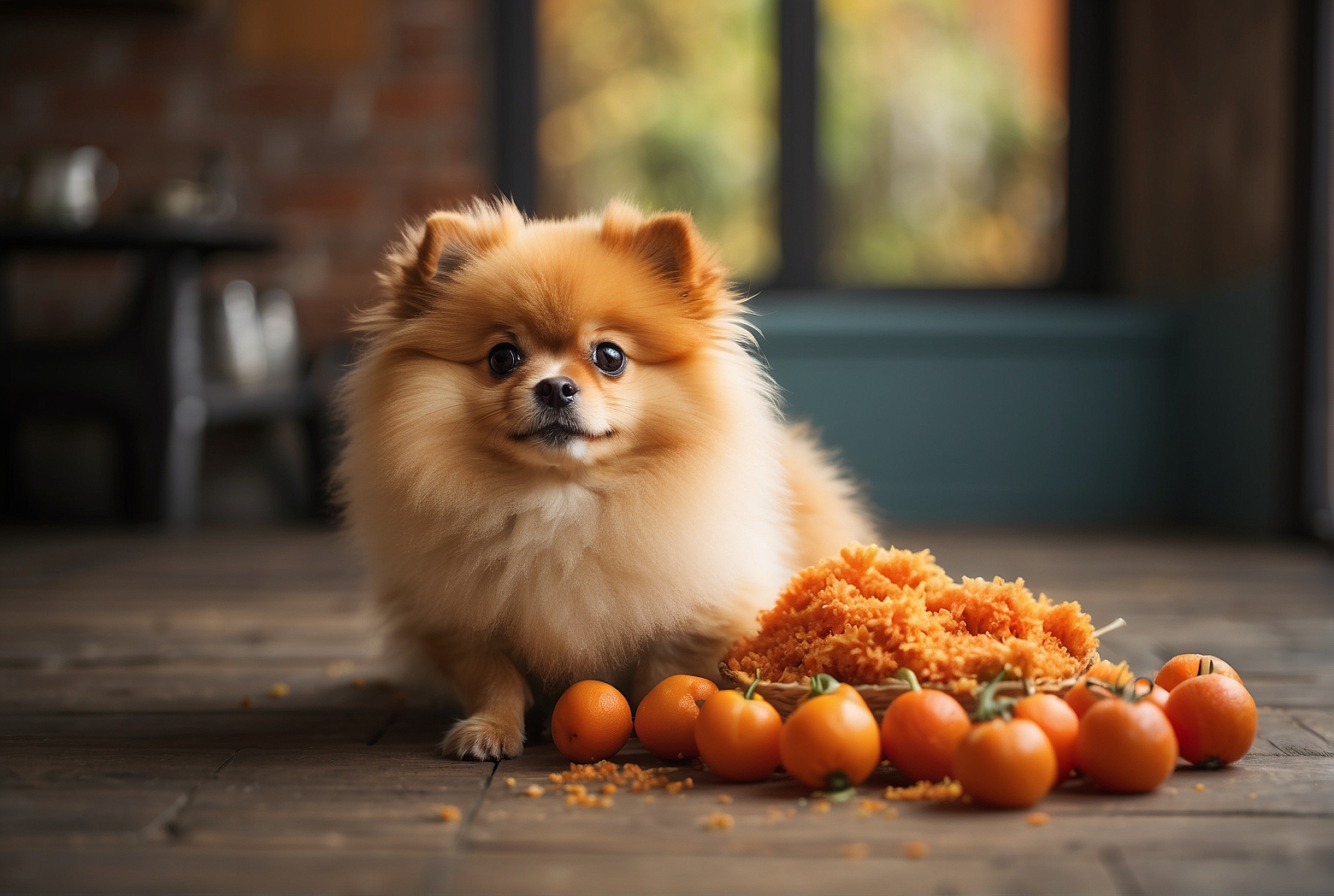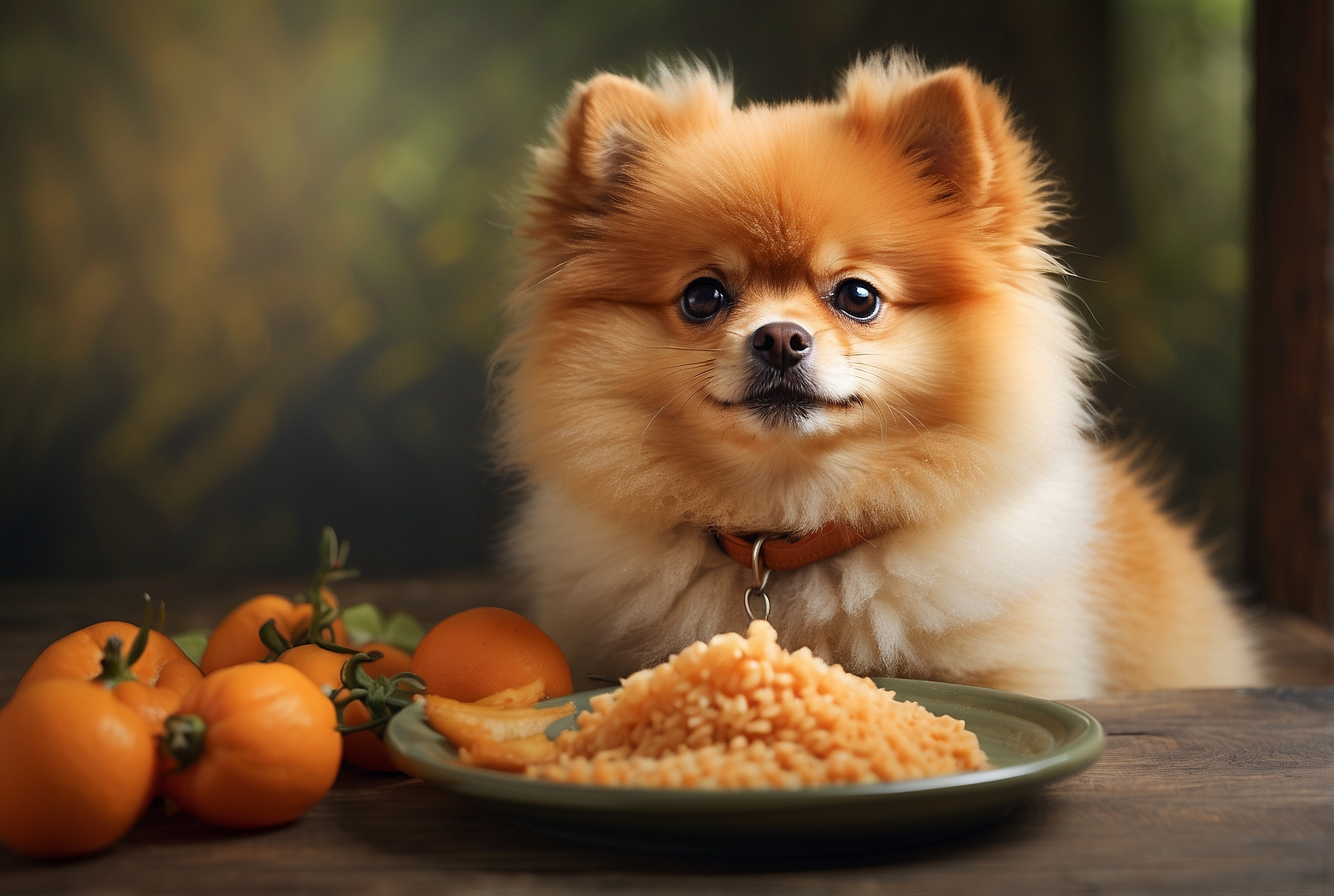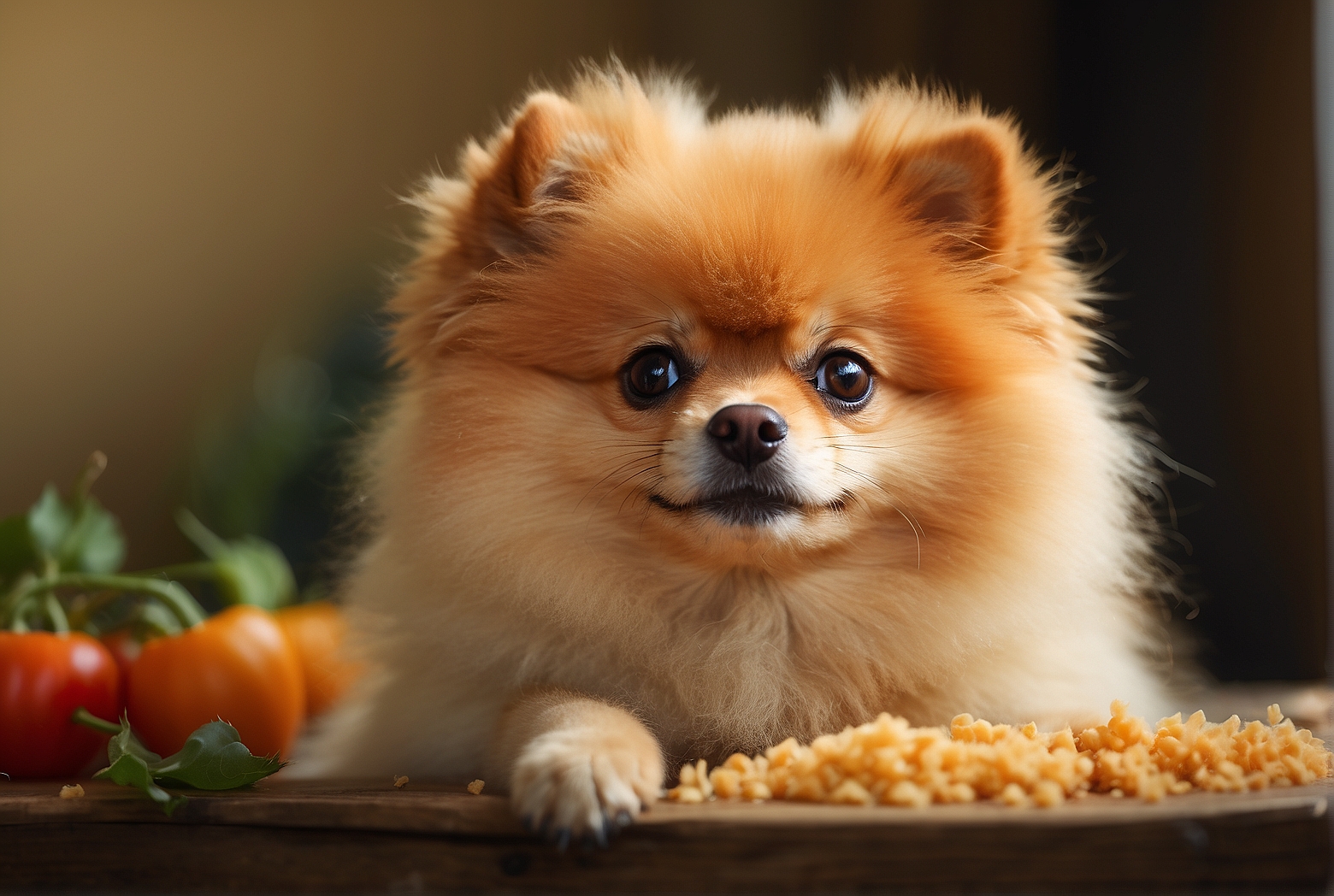So, you’ve recently welcomed a fluffy and adorable Pomeranian into your life, and you’re wondering what you should be feeding them to keep them healthy and happy. Well, fret not, because in this article, we’ll explore the various options for your Pomeranian’s diet and provide you with some valuable insights on what foods are best suited for their needs. From understanding the unique nutritional requirements of this small breed to discovering the do’s and don’ts of Pomeranian feeding, we’ve got you covered. Let’s ensure your Pomeranian gets the nourishment they deserve!
Pomeranian Nutritional Needs
Understanding the Pomeranian’s dietary requirements
As a Pomeranian owner, it is crucial to understand your furry friend’s dietary requirements to ensure they live a healthy and happy life. Pomeranians are small dogs with high energy levels, which means they have unique nutritional needs. Providing them with a well-balanced diet is essential for their overall well-being.
Importance of a well-balanced diet
A well-balanced diet plays a vital role in maintaining your Pomeranian’s health. It provides them with the necessary nutrients, vitamins, and minerals to support their growth, maintain a healthy weight, and strengthen their immune system. A proper diet can also help prevent common health issues such as obesity, dental problems, and skin allergies.
Factors influencing your Pomeranian’s nutritional needs
Several factors influence your Pomeranian’s nutritional needs, including their age, size, activity level, and overall health. Puppies require a diet that supports their growth and development, while adult Pomeranians may have different dietary requirements. Additionally, if your Pomeranian has any specific health conditions or allergies, their nutritional needs may vary. Consulting with a veterinarian can provide personalized guidance on meeting your Pomeranian’s specific nutritional requirements.
Commercial Dog Food
Benefits of using commercial dog food
Commercial dog food offers several benefits for your Pomeranian’s nutrition. It is specifically formulated to meet the dietary needs of dogs, including Pomeranians. These foods undergo strict quality control measures to ensure that they contain the necessary nutrients in the right proportions. Moreover, commercial dog food often provides a balanced combination of proteins, carbohydrates, fats, and essential vitamins and minerals.
Choosing the right commercial dog food
When selecting commercial dog food for your Pomeranian, it is essential to consider their age, size, and specific dietary needs. Look for a reputable brand that offers formulas specifically designed for small breed dogs. Read the ingredient list to ensure that real meat is the primary protein source and that it doesn’t contain any artificial additives or fillers. Some brands also offer specialized formulas catering to specific health needs, such as sensitive digestion or joint support.

Understanding dog food labels
Understanding dog food labels is crucial in making informed decisions about your Pomeranian’s diet. The label should list the ingredients in descending order of quantity. Look for specific named animal proteins, such as chicken or beef, rather than generic terms like “meat.” Avoid foods with excessive fillers or artificial ingredients. Additionally, pet food labels include a guaranteed analysis that provides information about the food’s nutrient content. Ensuring that your Pomeranian’s food meets the Association of American Feed Control Officials (AAFCO) standards can provide further assurance of its quality.
Home-Cooked Meals
Advantages of home-cooked meals
Preparing home-cooked meals for your Pomeranian can offer several advantages. First and foremost, it allows you to have full control over the ingredients, ensuring the use of high-quality and fresh ingredients. Additionally, home-cooked meals can be tailored to meet any specific dietary needs or allergies your Pomeranian may have. In some cases, it can also be a more cost-effective option in comparison to premium commercial dog food.
Ingredients to include in homemade meals
When preparing homemade meals for your Pomeranian, it is crucial to include a balanced combination of protein, carbohydrates, and healthy fats. Protein sources can include lean meats like chicken or turkey, and carbohydrates can be sourced from vegetables like sweet potatoes or carrots. Healthy fats can be added through ingredients like fish oil or coconut oil. Remember to avoid ingredients that are toxic to dogs, such as onions, garlic, or grapes. It is also recommended to consult with a veterinarian or veterinary nutritionist to ensure that you are providing a complete and balanced diet.
Preparing balanced homemade meals
Preparing a balanced homemade diet for your Pomeranian requires careful planning. It is essential to include the right proportions of protein, carbohydrates, and fats. Consider consulting with a veterinarian or veterinary nutritionist to develop a recipe that meets your Pomeranian’s specific nutritional needs. Additionally, it is important to regularly monitor your dog’s weight and adjust the portions accordingly. Providing a variety of ingredients can help ensure that your Pomeranian receives a wide range of nutrients.
Raw Food Diet
Benefits of a raw food diet
Feeding your Pomeranian a raw food diet can offer numerous benefits. Many owners believe that a raw diet more closely resembles what dogs would eat in the wild. Raw food diets often contain natural and unprocessed ingredients, including raw meat, bones, fruits, and vegetables. Supporters of this diet claim that it can lead to shinier coats, healthier skin, improved digestion, and increased energy levels for Pomeranians.
Choosing the right ingredients for a raw food diet
Choosing the right ingredients for a raw food diet is crucial to ensure your Pomeranian’s nutritional needs are met. The diet should consist of high-quality, human-grade ingredients, including raw meat (such as chicken, turkey, or beef), raw bones, and a variety of fruits and vegetables. It is important to ensure that the diet is nutritionally balanced and meets your Pomeranian’s specific needs. Consulting with a veterinarian or veterinary nutritionist can help guide you in choosing the right ingredients and supplements.

Ensuring safety when feeding a raw food diet
Feeding a raw food diet requires extra attention to safety precautions. Raw meat and bones can carry bacteria such as salmonella or E. coli, which may pose a risk to both your Pomeranian and yourself. Make sure to handle and store raw food properly, keeping them separate from other foods in the refrigerator. Thoroughly clean any equipment or surfaces that come into contact with raw food. Additionally, it is crucial to monitor your Pomeranian for any adverse reactions to the raw food and consult with a veterinarian if any concerns arise.
Treats and Snacks
Choosing healthy and nutritious treats
Treats and snacks are an essential part of your Pomeranian’s diet, but it is important to choose healthy and nutritious options. Look for treats that are made with high-quality ingredients and do not contain any artificial additives, fillers, or preservatives. Treats that are rich in protein, such as freeze-dried meat or jerky, can be a good option. Avoid treats that are high in fat or sugar, as they can contribute to weight gain and dental problems.
Homemade treat options
Making homemade treats for your Pomeranian can be a fun and rewarding experience. You can use ingredients like lean meats, fruits, and vegetables to create delicious and healthy treats. For example, you can bake homemade dog biscuits using whole wheat flour, chicken broth, and peanut butter. Another option is freezing small pieces of fruit or vegetables to create refreshing and nutritious treats for your Pomeranian to enjoy on hot days. Remember to introduce new treats gradually and in moderation to avoid any digestive upset.
Avoiding harmful ingredients in store-bought treats
When purchasing store-bought treats for your Pomeranian, it is crucial to read and understand the ingredient list. Avoid treats that contain artificial additives, fillers, or by-products. Look for treats that are made with real meat as the primary ingredient. Additionally, be cautious of treats that are high in fat, sodium, or sugar. If your Pomeranian has any specific dietary restrictions or allergies, ensure that the treats do not contain any ingredients that could be harmful to them.
Foods to Avoid
Toxic foods for Pomeranians
Certain foods are toxic to Pomeranians and should be strictly avoided. These include chocolate, grapes and raisins, onions and garlic, caffeine, alcohol, macadamia nuts, and artificial sweeteners such as xylitol. These foods can cause severe health issues, including kidney failure, gastrointestinal problems, and even death. Ensure that your Pomeranian does not have access to these foods and keep them stored safely out of reach.
Harmful ingredients in dog food
It is important to be aware of potentially harmful ingredients in dog food as well. Some dog food brands may include artificial additives, preservatives, and excessive fillers that can negatively impact your Pomeranian’s health. Common harmful ingredients to watch out for include artificial colors, flavors, and preservatives like BHA and BHT. Opt for brands that prioritize natural and high-quality ingredients to ensure your Pomeranian receives the best nutrition possible.
Common human foods that are dangerous for Pomeranians
While sharing food can be tempting, there are several common human foods that are dangerous for Pomeranians and should never be given to them. These include chocolate, onions, garlic, grapes and raisins, avocados, certain nuts (such as macadamia nuts), caffeine, alcohol, and foods containing xylitol (an artificial sweetener). It is important to educate yourself and others in your household about these dangerous foods to avoid any accidental ingestion that can lead to serious health issues for your Pomeranian.
Feeding Schedule
Determining the right feeding schedule
Establishing a regular feeding schedule is essential for your Pomeranian’s overall health and well-being. It is recommended to divide your Pomeranian’s daily food intake into two to three smaller meals, depending on their age and activity level. A consistent feeding schedule helps with digestion and can prevent issues like bloating or obesity. Although Pomeranians are known for their small size, it is important not to free-feed them, as it can lead to overeating and weight gain.
Frequency and portion sizes for Pomeranians
The frequency and portion sizes of meals for your Pomeranian depend on their age, size, and activity level. Puppies typically need to be fed more often than adult dogs, usually three to four times a day, as they have higher energy needs. Adult Pomeranians can be fed two to three times a day. It is important to consult with your veterinarian to determine the appropriate portion sizes for your Pomeranian, as it can vary based on their individual needs and metabolism.
Monitoring your Pomeranian’s weight and adjusting the feeding schedule
Regular monitoring of your Pomeranian’s weight is crucial to ensure they are maintaining a healthy body condition. Keep an eye on their body shape and feel their ribs for an indication of their weight. If your Pomeranian is gaining weight, it may be necessary to adjust their portion sizes or switch to a lower-calorie diet. On the other hand, if your Pomeranian is losing weight or appears underweight, it may be a sign that they require more food. Consult with your veterinarian for guidance in managing your Pomeranian’s weight and adjusting their feeding schedule accordingly.
Feeding Tips
Feeding guidelines for puppies and adult Pomeranians
Feeding guidelines for puppies and adult Pomeranians are slightly different due to their varying nutritional needs. Puppies require a diet that supports their growth and development. Ensure that their food is formulated specifically for puppies and follow the recommended portion sizes provided by the manufacturer or your veterinarian. As Pomeranians reach adulthood, their caloric needs decrease, so adjust their portion sizes accordingly. Regularly monitor their body condition and consult with a veterinarian if you have any concerns about their weight or feeding routine.
Addressing picky eaters
Some Pomeranians can be picky eaters, making mealtime a bit challenging. If you have a picky eater on your hands, there are several strategies you can try. Firstly, ensure that you are offering a high-quality and palatable food option. Experiment with different flavors and textures to see what your Pomeranian prefers. You can also try feeding smaller, more frequent meals or warming the food slightly to enhance its aroma. Avoid free-feeding and establish a regular feeding schedule. If the picky eating persists or is accompanied by other health concerns, consult with your veterinarian for further guidance.
Monitoring food allergies and sensitivities
Just like humans, dogs, including Pomeranians, can develop food allergies or sensitivities. Common signs of food allergies include itchiness, gastrointestinal upset, excessive licking, or ear infections. If you suspect that your Pomeranian has an allergy or sensitivity to certain ingredients, it is important to identify and eliminate the culprit from their diet. Consult with your veterinarian for guidance on conducting an elimination diet or performing allergy testing to pinpoint the exact allergen. Providing a hypoallergenic diet or selecting commercial foods that cater to specific sensitivities may be necessary to manage your Pomeranian’s allergies successfully.
Water and Hydration
Importance of access to fresh water
Proper hydration is essential for your Pomeranian’s overall health and well-being. Always provide access to fresh, clean water throughout the day to ensure your Pomeranian stays hydrated. Monitor the water bowl regularly and refill it as needed. During hot weather or if your Pomeranian is particularly active, make sure to check and refill the water more frequently to prevent dehydration. Water should be easily accessible and placed in a location where your Pomeranian can reach it comfortably.
Signs of dehydration in Pomeranians
It is important to be aware of the signs of dehydration in Pomeranians. Some common signs of dehydration include increased panting, dry nose and gums, loss of skin elasticity, sunken eyes, and lethargy. If you suspect that your Pomeranian is dehydrated, try encouraging them to drink water or offer them ice cubes. If the dehydration persists or is accompanied by other concerning symptoms, such as vomiting or diarrhea, consult with your veterinarian immediately for proper evaluation and treatment.
Tips to encourage water consumption
Encouraging your Pomeranian to drink enough water is vital for their health. Some dogs may be hesitant to drink water, especially if they are used to eating moist foods. Here are a few tips to promote water consumption:
-
Choose a clean and fresh water source: Ensure that the water bowl is clean and refill it with fresh water regularly. Stagnant water may not be appealing to your Pomeranian.
-
Try different water bowls: Some dogs have preferences for certain types of water bowls. Experiment with different materials, shapes, and sizes to find one that your Pomeranian prefers.
-
Add flavor to the water: Infusing water with a small amount of chicken broth or bone broth can add an enticing aroma and flavor, enticing your Pomeranian to drink more.
-
Use a pet water fountain: Some dogs are attracted to the sound and movement of water, so investing in a pet water fountain may encourage them to drink more.
-
Monitor water temperature: Dogs may prefer cool or room temperature water. Avoid offering extremely cold water, as it may be uncomfortable for your Pomeranian to drink.
Remember, if you have concerns about your Pomeranian’s water consumption or suspect dehydration, consult with your veterinarian for appropriate guidance.
Consulting a Veterinarian
When to seek professional advice
While you can make informed decisions about your Pomeranian’s diet, it is important to seek professional advice from a veterinarian. You should consult with a veterinarian if your Pomeranian has any specific health concerns or conditions that may require a specialized diet. Additionally, if you notice any concerning symptoms such as sudden weight loss, excessive weight gain, frequent digestive issues, or changes in appetite, consulting with a veterinarian is crucial for proper evaluation and treatment.
Getting a personalized diet plan for your Pomeranian
Every Pomeranian is unique, and their nutritional needs may vary. Consulting with a veterinarian or veterinary nutritionist can help you develop a personalized diet plan tailored to your Pomeranian’s specific needs. They can assess your Pomeranian’s overall health, take into account any dietary restrictions or allergies, and provide guidance on the appropriate diet and portion sizes. A personalized diet plan ensures that your Pomeranian receives optimal nutrition for their individual requirements.
Monitoring and reassessing your Pomeranian’s diet
Once you have established a diet plan with the guidance of a veterinarian, it is important to monitor and reassess your Pomeranian’s diet regularly. Keep an eye on their weight and body condition. If you notice any changes or develop concerns about their health, consult with your veterinarian for a reassessment of their diet. Regular check-ups and communication with your veterinarian can help ensure that your Pomeranian’s nutritional needs are always met and adjustments can be made as necessary.
In conclusion, understanding and meeting your Pomeranian’s nutritional needs is crucial for their overall health and well-being. Whether you choose commercial dog food, home-cooked meals, a raw food diet, or a combination of these, providing a balanced and nutritious diet is essential. Consult with a veterinarian to develop a personalized diet plan and monitor your Pomeranian’s weight and overall health regularly. With proper nutrition and care, your Pomeranian can thrive and lead a happy and healthy life by your side.
